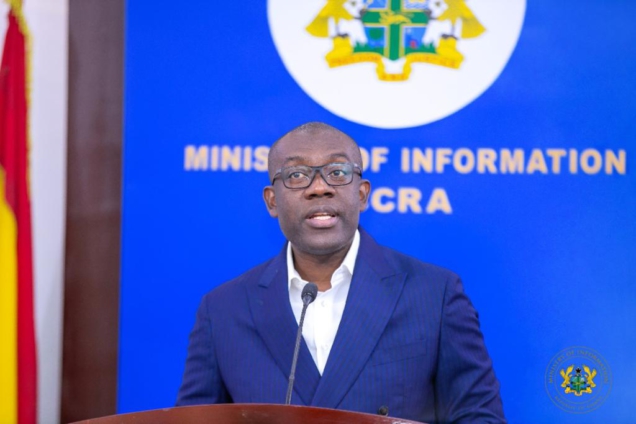Minister for Information Kojo Oppong Nkrumah has revealed that many agencies operating at the District Assembly level do not report to the Assembly.
He stated that many of these agencies have officers who report directly to officials in the capital, Accra, rather than the District Chief Executive.
Speaking on Joy FM, he mentioned that this causes partial administrative decentralization.
“Therefore, their ability to fit in the local government structure and respond to the issues there is always questioned. That is the administrative decentralisation that he (Dr. Mahamudu Bawumia ) is talking about.”
The comments by the Information Minister follow statements made by the 2024 flagbearer of the NPP during his national address held at the UPSA auditorium in Accra.
While addressing the nation, Dr Bawumia stressed the significance of enhancing the role of the private sector, the need for fiscal and administrative decentralisation, and improving system functionality and institutional performance.
This, he believes, will not only lead to greater efficiency but also ensure value for money in government procurement processes.
“The move towards private sector provision of many public services would create fiscal space of at least 3% of GDP. This represents a major paradigm shift. Additionally, an efficient system of governance will require even fewer ministers,” Dr. Bawumia explained.
He added that his administration plans to reduce the fiscal burden on government by building upon successful initiatives such as the Free SHS and Free TVET introduced during the tenure of Nana Akufo-Addo’s government.
Touching on this, Mr Oppong Nkrumah said the policies which will be implemented by a Bawumia-led administration will help to address the issue of insufficient funding and low revenues recorded at the District Assembly level.
“One of the things I know he has been actively working on is, for example, the remnant of the infrastructure budget and what part of that can be dedicated to lower-level infrastructure.
"It is similar to what in this regime we have tried to do with the Development Authorities which have had its challenges but it circumvents it in a way and ensures that within the national budget, we have had some physical resources allocated for specific district to execute some projects.
“So when he talks about physical and administrative decentralisation, there is a difference between what we are doing now and what he would do if he becomes the leader of the Republic of Ghana on January 7, 2025," Mr Oppong Nkrumah said.
Latest Stories
-
We’ll cut down imports and boost consumption of local rice and other products – Mahama
48 mins -
Prof Opoku-Agyemang donates to Tamale orphanage to mark her birthday
2 hours -
Don’t call re-painted old schools brand new infrastructure – Prof Opoku-Agyemang tells gov’t
3 hours -
Sunon Asogli plant will be back on stream in a few weeks – ECG
3 hours -
ECOWAS deploys observers for Dec. 7 election
3 hours -
73 officers commissioned into Ghana Armed Forces
3 hours -
Impending shutdown of three power plants won’t happen – ECG MD
3 hours -
Ghana shouldn’t have experienced any ‘dumsor’ after 2017 – IES Boss
4 hours -
Lamens flouted some food safety laws in re-bagging rice – Former FDA Boss Alhaji Hudu Mogtari
4 hours -
Afcon exit: Our issue is administrative failure and mismanagement, not lack of talent – Saddick Adams
5 hours -
WAPCo to commence major pipeline maintenance and inspection from November 25
5 hours -
CEO of Oro Oil Ghana Limited Maxwell Commey listed among the 100 Most Influential People Awards, 2024
5 hours -
Power crisis: Amandi is off due to maintenance, not debt – ECG Boss
5 hours -
Votes cast for late Akua Donkor to be declared invalid – Electoral Commission
5 hours -
You can’t keep “incompetent” Otto Addo for the long term – Countryman Songo
6 hours

